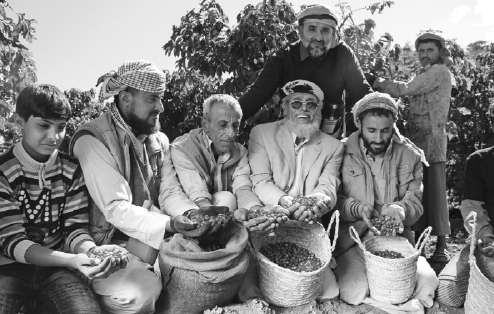War-torn Yemen harvests coffee

SANAA, Yemen-In a verdant highland village in the Haraaz area, about 100 kilometers west of the Yemeni capital Sanaa, farmers have begun to harvest their coffee crop, amid the tough challenges of a raging civil war.
"We mainly rely on the rainy season to irrigate coffee plants since the war broke out more than four years ago. It cut electricity and triggered a severe fuel shortage," farmer Mohsen Al-Hamassi said at his coffee farm in al-Hutib village, east of Haraaz.
"Fuel prices on the black market have tripled, making it difficult for many farmers to run their own irrigation pumps, and the solar energy to run the water pumps is very expensive," he said, adding that only some can afford to install solar systems.
Yemeni coffee is highly sought after in the international markets due to its high quality and delicious taste, but the prolonged conflict and all-out blockade have prevented farmers from increasing the production and exporting their crop abroad.
However, despite these challenges, the farmers here have been trying to keep up the tempo of coffee production, although total Yemeni production has declined.
'Red rubies'
Yemenis were the first to export coffee hundreds of years ago, through the thriving Red Sea port of Mocha, also known as al-Mokha, about 250 km west of Haraaz.
The Mocha port now serves as a military base for the Saudi-led military coalition forces, which support the troops of the Yemeni government of President Abd-Rabbu Mansour Hadi against the Iran-allied Houthi rebel group.
Coalition forces recaptured the port in July last year.
Al-Hamassi, 55, inherited the farm from his father. His ancestors have grown coffee for hundreds of years in the area. Al-Hamassi's family is one of thousands of Yemeni families that entirely rely on coffee cultivation to earn a living.
Yemenis call the coffee beans "red rubies" and the farmers chant folk songs loudly during the harvest.
Yasmin, a student at Sanaa University, said the coffee is an Arab symbol of hospitality and is always provided to guests. It is also a symbol of love during family activities. She compared the feeling of drinking coffee to the pleasure of reading a book, drawing or listening to music.
"I bet Yemeni coffee is good to the last drop," Yasmin added.

Today's Top News
- Militarism revival efforts criticized
- Leadership highlights Party conduct
- Forging a human-centered future in era of smart machines
- Land-sea trade corridor key to regional progress
- Local rules to be reviewed to help disabled
- Stronger RMB points to resilience






























